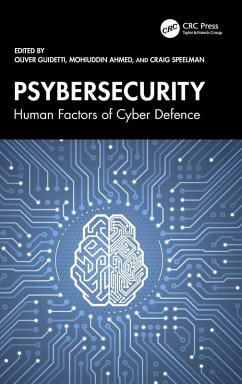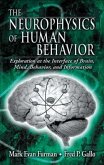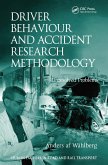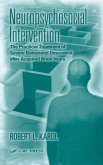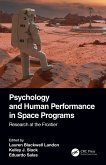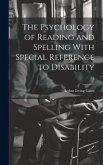Psybersecurity
Human Factors of Cyber Defence
Herausgeber: Guidetti, Oliver; Speelman, Craig; Ahmed, Mohiuddin
Psybersecurity
Human Factors of Cyber Defence
Herausgeber: Guidetti, Oliver; Speelman, Craig; Ahmed, Mohiuddin
- Gebundenes Buch
- Merkliste
- Auf die Merkliste
- Bewerten Bewerten
- Teilen
- Produkt teilen
- Produkterinnerung
- Produkterinnerung
Psybersecurity: Human Factors of Cyber Defence is a clarion call to action in the face of a stark reality: over 90% of cyber attacks exploit human vulnerabilities, as highlighted by the 2022 Global Risks Report from the World Economic Forum.
Andere Kunden interessierten sich auch für
![The Connected Parent The Connected Parent]() John PalfreyThe Connected Parent21,99 €
John PalfreyThe Connected Parent21,99 €![The Neurophysics of Human Behavior The Neurophysics of Human Behavior]() Mark E. FurmanThe Neurophysics of Human Behavior229,99 €
Mark E. FurmanThe Neurophysics of Human Behavior229,99 €![Driver Behaviour and Accident Research Methodology Driver Behaviour and Accident Research Methodology]() Anders Af WåhlbergDriver Behaviour and Accident Research Methodology200,99 €
Anders Af WåhlbergDriver Behaviour and Accident Research Methodology200,99 €![Neuropsychosocial Intervention Neuropsychosocial Intervention]() Robert L. KarolNeuropsychosocial Intervention210,99 €
Robert L. KarolNeuropsychosocial Intervention210,99 €![Critical Incident Stress Management in Aviation Critical Incident Stress Management in Aviation]() Joachim VogtCritical Incident Stress Management in Aviation172,99 €
Joachim VogtCritical Incident Stress Management in Aviation172,99 €![Psychology and Human Performance in Space Programs Psychology and Human Performance in Space Programs]() Psychology and Human Performance in Space Programs200,99 €
Psychology and Human Performance in Space Programs200,99 €![The Psychology of Reading and Spelling With Special Reference to Disability The Psychology of Reading and Spelling With Special Reference to Disability]() Arthur Irving GatesThe Psychology of Reading and Spelling With Special Reference to Disability34,99 €
Arthur Irving GatesThe Psychology of Reading and Spelling With Special Reference to Disability34,99 €-
-
-
Psybersecurity: Human Factors of Cyber Defence is a clarion call to action in the face of a stark reality: over 90% of cyber attacks exploit human vulnerabilities, as highlighted by the 2022 Global Risks Report from the World Economic Forum.
Produktdetails
- Produktdetails
- Verlag: Taylor & Francis Ltd (Sales)
- Seitenzahl: 232
- Erscheinungstermin: 9. September 2024
- Englisch
- Abmessung: 234mm x 156mm x 16mm
- Gewicht: 531g
- ISBN-13: 9781032664835
- ISBN-10: 1032664835
- Artikelnr.: 70204738
- Herstellerkennzeichnung
- Libri GmbH
- Europaallee 1
- 36244 Bad Hersfeld
- gpsr@libri.de
- Verlag: Taylor & Francis Ltd (Sales)
- Seitenzahl: 232
- Erscheinungstermin: 9. September 2024
- Englisch
- Abmessung: 234mm x 156mm x 16mm
- Gewicht: 531g
- ISBN-13: 9781032664835
- ISBN-10: 1032664835
- Artikelnr.: 70204738
- Herstellerkennzeichnung
- Libri GmbH
- Europaallee 1
- 36244 Bad Hersfeld
- gpsr@libri.de
Oliver Guidetti is a postdoctoral researcher specialising in the human factors of cyber security. He has an extensive background working on applied socio-technical projects that examine the interplay between the human brain and technology. His PhD research focused on measuring and mitigating vigilance decrement in cyber network defence tasks. Guidetti has published numerous research papers on topics such as cyber vigilance tasks, the neuropsychology of network defence operators, human resource policy in relation to neurotechnology, and the effects of cognitive load on the performance of cyber first responders. Through his work, he hopes to contribute to our increasingly digital world's socio-technical security and resilience. Mohiuddin Ahmed is a Senior Lecturer of Computing and Security Discipline at the School of Science, Edith Cowan University, Australia. He earned his PhD in computer science from the University of New South Wales in 2016. He is a member of the Association for Computing Machinery (ACM), the Australian Information Security Association (AISA), a senior member of the Institute of Electrical and Electronics Engineers (IEEE), a Certified Professional of the Australian Computer Society (ACS), and a Fellow of the Higher Education Academy, UK. He is also an ACM Distinguished Speaker and delivered several keynotes and invited talks on cyber security. He has been educating the next generation of cyber leaders and researching to disrupt the cybercrime ecosystem. His research is focused on ensuring national security and safeguarding critical infrastructures from cyber terrorists. He secured several external and internal grants worth more than AU$1.7 million and has been collaborating with academia and industry. Craig Speelman has been Professor in the School of Psychology and Social Science, Edith Cowan University, since 2008. He was Head of the School between 2002-2011. Speelman conducts research in the general area of cognitive psychology, but much of his research has focused on the topic of skill acquisition and transfer. He is the author of Beyond the Learning Curve: The Construction of Mind and several book chapters. He has edited three research volumes and also authored papers published in highly ranked journals, including the Journal of Experimental Psychology: LMC, Nature Scientific Reports, Frontiers in Psychology, The American Journal of Geriatric Psychiatry, and PLOS ONE. He has received funding from the Australian Research Council, Health Workforce Australia, and the Association of Independent Schools (AISWA). He has served on editorial boards of journals and was the editor-in-chief of the GSTF Journal of Psychology. He has served on the organising committees for national and international psychology conferences. Speelman has applied this expertise to developing a training program for acquiring skin cancer detection skills, the development of basic arithmetic skills, where he produced the commercial app Numbeat, and psychological aspects of cyber security.
List of Figures, Tables, and Equations. Preface. About the Editors. List of
Contributors. Chapter 1: Integrating Human Factors and Systemic Resilience:
An Interdisciplinary Approach to Cyber Security in Critical Infrastructures
and Utilities. Chapter 2: Analysing Cyber Physical Attacks: The Human
Operator Challenge in Mining. Chapter 3: Building Cognitive Resilience for
Enhanced Cyber Governance. Chapter 4: Cyber Security in Australian Higher
Education Curricula: The SFIA Framework. Chapter 5: Dark Echoes: The
Exploitative Potential of Generative AI in Online Harassment. Chapter 6:
Trust and Risk: Psybersecurity in the AI Era. Chapter 7: Security Through
Influence Over Mandate. Chapter 8: Human Skills and Socio-Cultural Impacts
of K-12 Cyber Security Education. Chapter 9: Incident Response Drills On
Cyber Ranges: Enhancing Cyber-Defence Education. Index
Contributors. Chapter 1: Integrating Human Factors and Systemic Resilience:
An Interdisciplinary Approach to Cyber Security in Critical Infrastructures
and Utilities. Chapter 2: Analysing Cyber Physical Attacks: The Human
Operator Challenge in Mining. Chapter 3: Building Cognitive Resilience for
Enhanced Cyber Governance. Chapter 4: Cyber Security in Australian Higher
Education Curricula: The SFIA Framework. Chapter 5: Dark Echoes: The
Exploitative Potential of Generative AI in Online Harassment. Chapter 6:
Trust and Risk: Psybersecurity in the AI Era. Chapter 7: Security Through
Influence Over Mandate. Chapter 8: Human Skills and Socio-Cultural Impacts
of K-12 Cyber Security Education. Chapter 9: Incident Response Drills On
Cyber Ranges: Enhancing Cyber-Defence Education. Index
List of Figures, Tables, and Equations. Preface. About the Editors. List of
Contributors. Chapter 1: Integrating Human Factors and Systemic Resilience:
An Interdisciplinary Approach to Cyber Security in Critical Infrastructures
and Utilities. Chapter 2: Analysing Cyber Physical Attacks: The Human
Operator Challenge in Mining. Chapter 3: Building Cognitive Resilience for
Enhanced Cyber Governance. Chapter 4: Cyber Security in Australian Higher
Education Curricula: The SFIA Framework. Chapter 5: Dark Echoes: The
Exploitative Potential of Generative AI in Online Harassment. Chapter 6:
Trust and Risk: Psybersecurity in the AI Era. Chapter 7: Security Through
Influence Over Mandate. Chapter 8: Human Skills and Socio-Cultural Impacts
of K-12 Cyber Security Education. Chapter 9: Incident Response Drills On
Cyber Ranges: Enhancing Cyber-Defence Education. Index
Contributors. Chapter 1: Integrating Human Factors and Systemic Resilience:
An Interdisciplinary Approach to Cyber Security in Critical Infrastructures
and Utilities. Chapter 2: Analysing Cyber Physical Attacks: The Human
Operator Challenge in Mining. Chapter 3: Building Cognitive Resilience for
Enhanced Cyber Governance. Chapter 4: Cyber Security in Australian Higher
Education Curricula: The SFIA Framework. Chapter 5: Dark Echoes: The
Exploitative Potential of Generative AI in Online Harassment. Chapter 6:
Trust and Risk: Psybersecurity in the AI Era. Chapter 7: Security Through
Influence Over Mandate. Chapter 8: Human Skills and Socio-Cultural Impacts
of K-12 Cyber Security Education. Chapter 9: Incident Response Drills On
Cyber Ranges: Enhancing Cyber-Defence Education. Index

